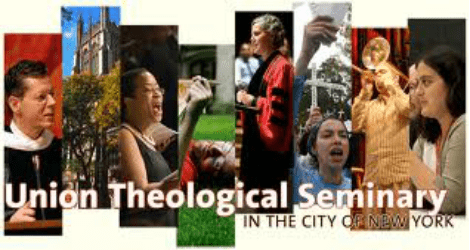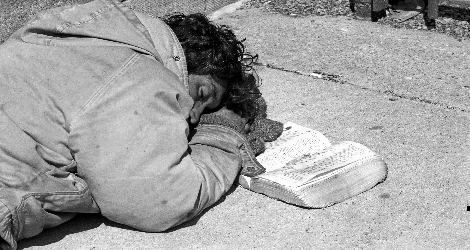Resources from Calvin: Vocation and Stewardship
[wpcol_1half id=”” class=”” style=””]
Central to understanding Calvin’s thought on human economic activity is an appreciation of the related doctrines of vocation and stewardship. While Calvin will have important things to say about the role of government, he is primarily focused on individual action in community and the idea of the common good looms large in all of his reflections.
Calvin’s doctrine of vocation follows from the work of Martin Luther, a generation before him. In his essay, “Talent and Vocation in Human and Protestant Thought,” Richard Douglas asserts that concerning vocation “Calvin’s position was essentially the same as Luther’s in every important assumption.”[2] Douglas only slightly overstates his case. Calvin adopted large pieces of Luther’s doctrine, believing that all Christians were endowed with a vocation and that the proper functioning of the Christian community depended on the combined efforts of multiple talents. Both Luther and Calvin viewed Christian economic life as fundamentally co-operative and not as competitive.
Luther’s most important contribution to the development of the doctrine was in broadening vocation to include a wide range of human activity, challenging contemporary theories that limited vocation to religious occupation. But Luther’s doctrine also shows him to be embedded in the medieval social structure in which he lived. He was confident that the social class structure of the period was a manifestation of God’s design, and while he was adamant that everyone is valuable in God’s economy, he also had little understanding of or appreciation for social mobility.
Calvin’s doctrine of vocation presses further than does Luther’s, championing a social order unfettered by social location. While Calvin and Luther do share important normative assumptions, to assert that they are “essentially the same in every important assumption” risks missing Calvin’s distinctive contributions. More satisfying, then, is Van’t Spijker’s assessment that “Calvin never had any doubts about the idea that he was continuing along the way indicated by Luther. But Calvin went further along this way.”[3]
Calvin makes clear that human beings have a role to play in creating and maintaining God’s social order. But the possibility of meaningful human work, creating anything resembling God’s economy, is, for Calvin, severely hampered by our bondage to sin, so much so that, without the intervention of God, our activity will be irredeemably tainted. For this reason, when Calvin deals with ethics, he deals with it under the category of Christian liberty.[4] Freed by God from sin, called to vocation, human beings become instruments of God’s work on earth, able and duty-bound to create and maintain a Christian social order through the agency of God working in them. Calvin writes of the human so much under the influence of God’s call that, when “animated by the spirit of Christ, he again begins to breathe.”[5]
Once Calvin has reminded us of the futility of our efforts unsupported by God’s grace, he gives us a picture of what human interaction should look like under the power of vocation. The proper direction of human vocational activity was outwards, towards others. He writes, of Paul’s letter to the Corinthians, “…he [Paul] orders every one to bring what he has to the common heap, and not keep back gifts of God in the way of enjoying every one his own, apart from others, but aim unitedly at the edification of all in common.”[6] Whatever else we may say about human activity in God’s economy, it is necessarily a co-operative affair with a robust sense of the common good taking precedence over any individual gain.
Calvin’s work is also particularly important to modern readers looking to reframe the narrative concerning the role of government. While it is true that individual human work is to be about creating and maintaining a Christian social order, that order will not happen through individual effort alone. For Calvin, government plays a conspicuous role, roughly equal to but separate from the church in social ethics. Government, while not always acting as such, is certainly a good in Calvin’s writing, ordained by God.
[/wpcol_1half] [wpcol_1half_end id=”” class=”” style=””]
While we would ideally conduct our economic transactions with others fairly, our impulses to goodness are corrupted by sin. The state is charged with a wide range of activity in the economic sphere, both in regulation and in distribution. Among the many functions of the state, Calvin notes that the state must create such conditions that “men may transact their business together without fraud or injustice; that integrity and modesty may be cultivated among them; in short, that there may be a public form of religion among Christians and that humanity may be maintained among men.”[7]
Vocations then exist both for individuals and for institutions in Calvin. Vocation is, for Calvin, the manifestation of God’s grace in the life of a Christian. It is a transforming call whereby we become vessels of divine possibility. We are to live as bearers of vocation in every aspect of our earthly lives, certainly including economic ones.
The interrelated doctrine of stewardship allows Calvin to comment on the allocation of resources in earthly society. On the question of property, Calvin neither scorned nor glorified private acquisition. But we hold property only as stewards.[8] Using this medieval metaphor describing a servant who managed a lord’s estate while the lord was away, Calvin insisted that such property as we have must be used wisely and generously.
André Biéler writes that unequal distribution of wealth is not, in Calvin’s system, an arbitrary matter, but rather a spur to the redistribution of goods, regarded with an almost sacramental reverence, realizing as it does both faithful stewardship in the giver and grateful acceptance in the receiver. Biéler explains, “The rich man has a providential mission. He is charged with sharing a part of his wealth…so that the poor will no longer be poor…The poor man is destined to be the neighbor of the rich, to be the one who, on the part of God, offers the rich man an opportunity…of freeing himself from monetary slavery.”[9] Such “mutual communication of goods,” according to Biéler, is not intended to eliminate the inequities which naturally occur given the multiplicity of vocations, but rather to mitigate their harsher consequences.[10]
Calvin, in a belief much twisted and abused by his theological progeny, did believe that personal material benefit on earth was a result of God’s grace, but “the purpose of grace does not end in possession but rather in the good works which should follow it.”[11] Because God’s grace is manifest in the good works which issue from possession, specifically in the transfer of goods, and because the poor as much as the rich have important roles to play in these transactions, the pernicious corollary which time and misrepresentation have attached to Calvin’s understanding of private property, that those of lesser means are therefore less graced, has no place in Calvin’s theology.[12] Reading from Calvin we learn that
It is an error which is far too common among men, to look upon those who are oppressed with afflictions as condemned or reprobate…Most men, from making judgments about the favor of God from an uncertain and transitory state of prosperity, applaud the rich, and those upon whom, as they say, fortune smiles; so, on the other hand, they insult contemptuously the wretched and miserable, and foolishly imagine that God hates them, because he does not exercise so much tolerance toward them as he does to the reprobate. The error of which I speak…is one which has prevailed in all ages of the world.[13]
The trained economist, looking in Calvin for an economic program more precise than his interrelated understanding of vocation and stewardship will be disappointed. Even given the exhaustive work done by Biéler on Calvin’s economic thought, one is forced to conclude with Herbert Lüthy that “Calvin speaks as a pastor and as a teacher of the Christian religion, and what he says, more or less incidentally, respecting the economic behavior of men is always an exegesis and an explanation of the teaching of the Scriptures as they relate to human conduct.”[14] Calvin may not be an economist, but he is an ethicist of unique significance. His ability to hold together an endorsement of private property with a scathing critique of undue luxury represents one of his most significant triumphs.
[/wpcol_1half_end]






Unbound Social